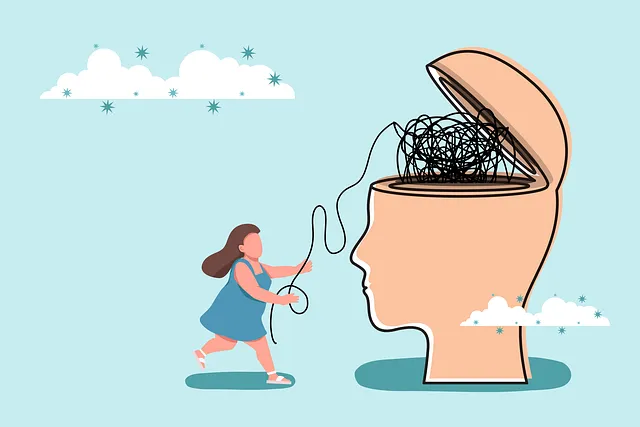Mental illness stigma in media, perpetuated by stereotypes and misinformation, prevents open dialogue and access to support. To combat this, promote accurate, compassionate representations of mental health, emphasizing self-care. Kaiser, a vital resource in Littleton, offers extensive services and advocates for systemic change. Media should adopt Empathy Building Strategies, feature diverse narratives, and showcase real-world access to services like Kaiser's. Breaking down stigma and barriers through education empowers individuals to seek support effectively.
In an era where media portrayal significantly influences public understanding, addressing the stigmatization of mental illness is imperative. This article explores strategies to challenge negative stereotypes and enhance accurate representation. We delve into the impact of real-life narratives on shaping perceptions, highlighting initiatives like Kaiser’s efforts in providing accessible mental health services. By examining these aspects, we aim to empower communities, especially in Littleton, to navigate barriers and access the necessary support, ultimately fostering a more empathetic society.
- Understanding Mental Illness Stigma in Media Portrayals
- The Impact of Real-Life Stories on Public Perception
- Kaiser's Role in Providing Accessible Mental Health Services
- Strategies for Accurate and Empathetic Media Representation
- Empowering Communities: Overcoming Barriers to Mental Healthcare Access
Understanding Mental Illness Stigma in Media Portrayals

Mental illness stigma is deeply rooted in society, often perpetuated by media portrayals that either sensationalize or trivialize conditions like depression and anxiety. The way mental health issues are depicted can significantly influence public understanding and the willingness to seek help. For instance, common stereotypes in movies and TV shows often frame individuals with mental illnesses as dangerous or unpredictable, leading to fear and avoidance. On the other hand, some media may present these struggles in a lighthearted manner, minimizing the severity of what it’s really like to live with a mental health condition.
This stigmatization makes it challenging for individuals to open up about their experiences and seek support. As such, it’s crucial to promote accurate and compassionate representations that highlight the diversity of mental illness while emphasizing the importance of self-care practices and inner strength development. Encouraging access to resources like how to get mental health services through Kaiser can also dispel myths and foster a culture of understanding and care, ultimately helping to prevent depression and other mental health challenges.
The Impact of Real-Life Stories on Public Perception

In today’s digital era, the way we consume media has evolved, allowing for more authentic and personal stories to be shared. This shift has significantly impacted public perception of mental illness, particularly when individuals with lived experiences tell their own tales. Real-life narratives offer a unique perspective that challenges stereotypical representations in media. By sharing their journeys, these individuals humanize mental health struggles, fostering empathy and understanding among audiences. For instance, the story of Littleton, who sought help through Kaiser for her mental health services, can inspire others to take that first step towards healing. Such personal accounts encourage people to view mental illness not as a taboo subject but as a common challenge that anyone can face, thereby reducing stigma and promoting early intervention.
Moreover, these stories often include insights into effective strategies for managing mental health, such as the power of Mindfulness Meditation in anxiety relief and Resilience Building. By witnessing real individuals overcoming obstacles, viewers are inspired to explore their own wellness paths. This intersection of personal storytelling and awareness raises awareness about accessible resources like Kaiser’s mental health services, encouraging those in need to how to get help without hesitation.
Kaiser's Role in Providing Accessible Mental Health Services

In the context of mental illness representation in media, Kaiser plays a pivotal role in providing accessible mental health services, especially in communities like Littleton. Kaiser’s extensive network of healthcare facilities and dedicated mental wellness coaching programs make it a trusted resource for those seeking support. The organization offers comprehensive care that addresses not just symptoms but also promotes holistic mental health development.
Beyond direct service provision, Kaiser engages in Mental Health Policy Analysis and Advocacy, driving systemic changes to improve access to mental health services. Their efforts include Empathy Building Strategies, fostering understanding and reducing stigma associated with mental illness. This multifaceted approach ensures that individuals like those in Littleton have easier access to the care they need, ultimately contributing to improved mental wellness outcomes.
Strategies for Accurate and Empathetic Media Representation

In representing mental illness accurately and empathetically, media has a significant role in shaping public understanding. To achieve this, creators should adopt Empathy Building Strategies that go beyond simplistic portrayals. This involves consulting with individuals living with mental health conditions, ensuring diverse narratives, and showcasing recovery as a spectrum rather than a linear journey. By presenting real-world experiences, especially through the lens of accessible services like those offered by Kaiser, media can guide viewers on how to get mental health services in their communities.
Incorporating stories that highlight the complexities of mental wellness and the support systems available is crucial. This prompts audiences to have more nuanced conversations about mental illness, fostering an environment where individuals feel comfortable seeking help. Furthermore, developing Mental Wellness Coaching Programs and providing Healthcare Provider Cultural Competency Training can contribute to more empathetic media representation. These initiatives ensure that creators and professionals alike are equipped to handle sensitive topics responsibly, ultimately enhancing the quality of mental health discourse in media.
Empowering Communities: Overcoming Barriers to Mental Healthcare Access

In many communities, including Littleton, access to mental healthcare remains a significant barrier due to various factors such as stigma, lack of awareness, and limited resources. Empowering individuals and families affected by mental illness starts with breaking down these barriers. Education plays a crucial role in this process; raising awareness about available services like those offered through Kaiser can dispel myths surrounding mental health treatment. Providing clear information on how to get mental health services ensures that people know the first steps to take when struggling.
Community initiatives focused on burnout prevention strategies for healthcare providers, empathy building, and self-esteem improvement are essential components in fostering an environment where individuals feel comfortable seeking support. By implementing these strategies, communities can enhance the accessibility of mental healthcare, ensuring that folks in Littleton and similar areas have the resources they need to navigate their mental health journeys effectively.
Media representation plays a pivotal role in shaping public perceptions about mental illness, with accurate and empathetic portrayals fostering understanding and reducing stigma. By sharing real-life stories and implementing strategies for ethical storytelling, we can create a more inclusive society that encourages individuals to seek help. Organizations like Kaiser strive to enhance mental health services accessibility, offering resources such as how to get mental health services through Kaiser in Littleton or similar locations. Empowering communities with knowledge and breaking down barriers to care is essential to ensuring everyone has access to the support they need for their mental well-being.






